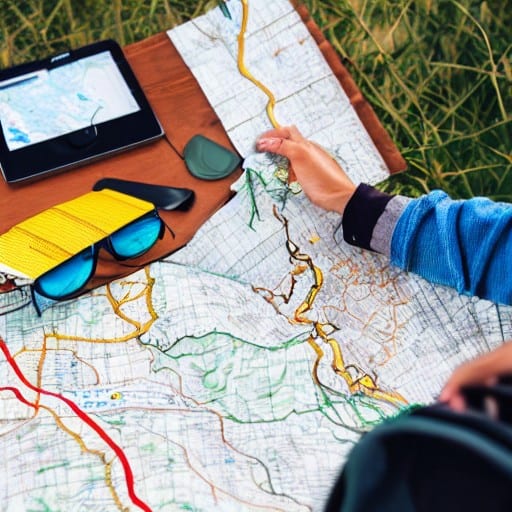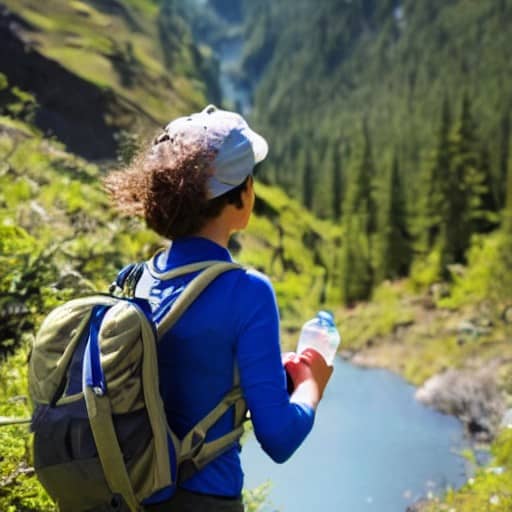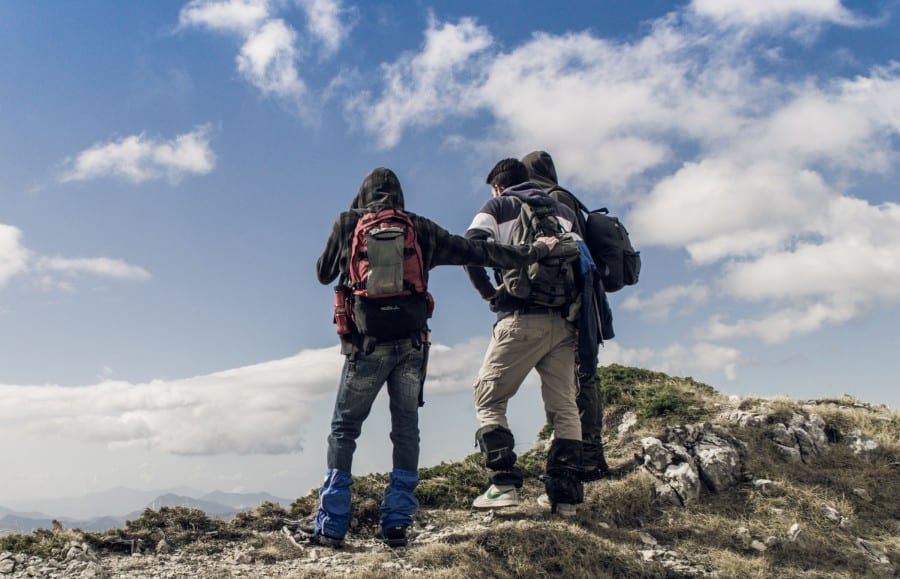Table of Contents
Some links on posts are affiliate links and will earn us a commission from qualifying purchases
People of all ages and fitness levels enjoy hiking, but it can be a challenging activity to get started with. If you’re just starting out, it’s easy to make mistakes that can ruin your hike and make the experience less enjoyable. In this post, we’ll share some tips for beginner hikers so you can avoid these mistakes and start hiking the right way.
Not preparing properly before your hike
One of the most common mistakes hikers make is lack of preparation. Many people think that as long as they have a good pair of hiking boots, they’re all set. However, there’s much more to hiking than just having the right gear. Before you head out on your next hike, take the time to properly prepare for your trip.
Not Checking the Weather Forecast
Before heading out on your next hike, it’s important to take the weather into account. Every year, people get stranded on hikes because they didn’t check the forecast and weren’t prepared for the conditions. So before you lace up your boots, be sure to check the temperature, rainfall, and wind speed for your planned hike. That way, you can dress appropriately and pack any safety gear you might need. And if the forecast changes unexpectedly, don’t be afraid to change your plans. After all, it’s better to be safe than sorry.
Packing heavy food and cooking utensils
Tin cans are especially heavy and difficult to carry, so leave them at home. Instead, focus on packing lightweight, high-energy foods that won’t weigh you down. Dried fruit, nuts, and jerky are all good options, and you can always supplement your food supply by foraging for edible plants along the way. With a little planning, you can make sure your trip is enjoyable and safe.
Planning your route
While it may be tempting to just head out into the wilderness and see where the trail takes you, this can often lead to getting lost or ending up in dangerous situation. Before setting out on a hike, make sure to map out your route and check for any potential hazards. This will help you stay safe and avoid getting lost. By taking these simple precautions, you can ensure a fun and safe hike for everyone involved.

Hiking alone without telling anyone where you’re going
If something happens and you don’t return when expected, it may be hours before anyone realizes you’re missing. To avoid this, always let someone know your expected return time and route before heading out on a solo hike. That way, if you don’t come back when expected, someone will know where to look for you.
Packing too much
A fully loaded rucksack can easily weigh 20kg or more, which is far too much for most people to comfortably carry over long distances. Not only will this slow you down and make the hike more difficult, but it can also lead to serious injuries such as back pain and muscle strain. To avoid this, carefully consider what you really need to take with you on the hike. essentials such as food, water and a first-aid kit are obviously essential, and appropriate clothing for the conditions, but try to leave any non-essentials at home. This will lighten your load and make the hike much more enjoyable.
Forgetting Something Important
Forgetting to bring essential items with them, such as a map, compass, or first-aid kit can be just as bad. This can easily lead to getting lost or injured, and it’s important to take the time to gather all of the necessary supplies before setting out.
Not Getting to Know Your Gear
Many people invest in backpacking gear without ever using it. They may take it out on a few day hikes, but their first real backpacking trip is when they take all their gear out into the wild and put it to use for an extended period of time. This is a mistake. It’s best to take some time to familiarise yourself with your equipment before embarking on a long trip. That way, you can avoid any surprises and be confident that you have everything you need. Choose simpler gear choices as a beginner, that way, you can focus on mastering the basics before moving on to more complicated setups. By taking a little time to prepare beforehand, you can ensure that your first backpacking trip is a success.
Beginner mistakes whilst on your route
Once you’ve got your preparation right, there’s also plenty to think about once you’ve set off on your hike.
Not dressing appropriately
One of the most common mistakes that hikers make is not dressing appropriately for the weather and terrain. This can lead to serious consequences, such as hypothermia or heat stroke. In order to avoid these risks, it is important to dress in layers. This will allow you to regulate your body temperature, regardless of the conditions outside. Another critical factor to consider is the type of footwear you will need. Make sure to choose shoes that are comfortable and provide good traction. If you are hiking in an area with a lot of rocks or scree, consider investing in a pair of hiking boots with ankle support. By taking the time to dress properly, you can prevent potentially dangerous situations from occurring on your hike.
Trying to do too much on your first hike
Another mistake that hikers often make is underestimating the difficulty of the hike. It’s important to know your own fitness level and choose a hike that is within your abilities. Otherwise, you may find yourself in over your head and struggling to complete the hike.
Ignoring your body’s warning signs
Hiking is a great way to get exercise and enjoy the outdoors, but it’s important to be aware of your surroundings and listen to your body. Ignoring danger signs can lead to serious injury or even death. If you’re feeling fatigued, take a break. If you’re getting lightheaded, stop and drink some water. It’s also important to watch for signs of dehydration, such as excessive thirst, dark urine, or fatigue. And if you start to feel disoriented or confused, sit down and wait for help. By paying attention to your body’s warning signs, you can ensure a safe and enjoyable hike.
Not carrying enough supplies or water
When hiking, it is important to bring enough water to prevent dehydration. Dehydration can lead to a whole host of problems, including heat exhaustion, muscle cramps, and dizziness. In extreme cases, it can even be fatal. That’s why it’s so important to carry plenty of water with you on any hike, especially if you’re hiking in hot weather. A good rule of thumb is to bring at least one liter of water for every hour of hiking. If you’re going on a longer hike, or if you know you’ll be sweating a lot, you should bring even more. dehydration can sneak up on you quickly, so it’s always better to err on the side of caution.

Not Eating and Drinking Enough
Hiking is a demanding activity that can quickly deplete energy supplies. Without proper nutrition, hikers will quickly become fatigued, making it more difficult to enjoy the hike and reach the destination. When you’re out on the trail, your body is working hard and needs energy to keep going. If you don’t fuel up properly, you may start to feel weak and dizzy. In extreme cases, you could even faint. To avoid this, pack plenty of snacks and drinks, and make sure to eat and drink regularly throughout your hike. Also, be sure to pack extra in case you get lost or end up hiking for longer than you planned.
Not Using Walking Poles
Many novice hikers make the mistake of thinking that walking poles are only for old people or those with balance problems. In reality, walking poles can be a valuable asset for hikers of all ages and abilities. Walking poles help to provide stability on uneven terrain and when going up and down hills. They also help to take some of the strain off of your legs, making it easier to maintain a good pace over long distances. In addition, walking poles can be used to help clear obstacles in your path or to signal for help in an emergency. So don’t be afraid to give them a try on your next hike – you might be surprised at how helpful they can be.
Ignoring the Threat of Blisters
Blisters can quickly ruin a hike, and even the most experienced hikers can find themselves suffering from this painful condition. The best way to avoid blisters is to be prepared. Before setting out on a hike, make sure that you have the proper footwear. Avoid shoes that are too tight or too loose, as this can increase the risk of blisters. In addition, be sure to break in new shoes before hitting the trail. Wearing socks that fit well and provide cushioning will also help to prevent blisters. If you do start to feel a hot spot on your foot, act quickly to prevent a blister from forming. Apply a bandage or moleskin to the area, and avoid wearing shoes that rub against the affected area.
Not Following Leave No Trace
Hiking is a great way to get some exercise and fresh air, but it’s important to do so responsibly. One of the most important principles of hiking is Leave No Trace, which means leaving the outdoors as untouched as possible. Do not leave your litter behind in the countryside. It’s important to be mindful of your impact on the environment and pack out everything you brought with you. In addition, Leave No Trace also means being careful not to disturb plant life or wildlife. Remember that you’re a guest in their home and respect their space. Hike responsibly and by following Leave No Trace principles, you’ll help ensure that our wilderness areas can be enjoyed for generations to come.
Not thinking about amount of time
It’s easy to underestimates how long hiking distances can take. If you’re not used to hiking long distances, it’s important to factor in extra time for breaks and rests. Otherwise, you risk getting tired and making mistakes that could jeopardize your safety. In addition to considering time, it’s also important to think about pace. If you start out too fast, you’ll quickly get exhausted and won’t be able to enjoy the hike. It’s better to start out slow and then increase your pace as you get more comfortable.It’s important to remember that hiking distances takes more time than you might expect. Even if you’re hiking on a relatively flat trail, the terrain can slow you down. And if you’re hiking in unfamiliar territory, it’s even more important to factor in time in case you make some wrong turns.
Conclusion – Common Mistakes for Novice Hikers
These beginner mistakes can easily be avoided by doing some simple preparation before your hike. Make sure you have the right gear, know the route, and bring enough food and water. If you’re still feeling nervous or unsure about embarking on a hike, check out some of our other articles to help get you started. So what are you waiting for? Get out there and start hiking!
Recent Posts
How Walking Improves Cardiovascular Health: Proven Heart Benefits
You can protect and strengthen your heart with a simple, low‑risk habit: walking regularly raises your fitness, helps lower blood pressure and cholesterol, and cuts the chance of heart problems...
Stay Cozy on the Peak: My Top 7 Merino Base Layers from Alpinetrek for Winter 2025/26
There is nothing quite like a crisp, misty morning at the trailhead. You know the feeling—the air is so sharp it stings your nose, the ground is crunchy with frost, and the peaks are calling your...


